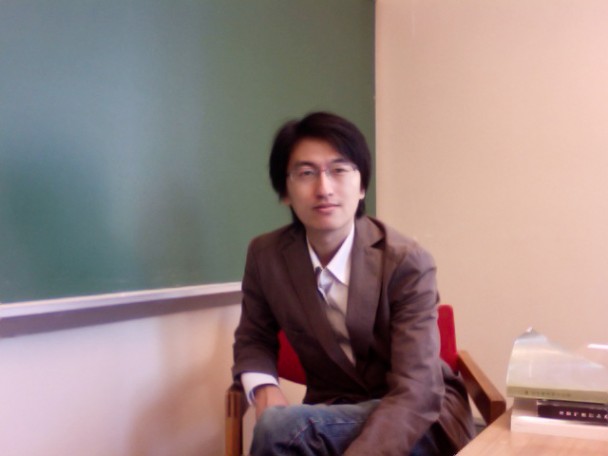
Ao Wang is an Assistant Professor of Asian Languages and Literatures. He received his Ph.D in Chinese literature at Yale University. In addition to teaching at Wesleyan, he has published several books of poetry, including “Quatrains and Legends,” which won the prestigious Anne Gao Poetry Prize. When not translating, writing, or teaching, Wang enjoys practicing Kuntao (a form of martial arts) and listening to Neil Young.
The Argus: So what’s on your bookshelf? Any books of particular significance to you?
Professor Ao Wang: I have a poetry book of Wallace Stevens, a 20th century American poet. I translated Steven’s first book “Harmonium” into Chinese. I have been reading his poetry for many years—it’s very special to me.
A: Do you do much translation from English to Chinese?
AW: Yes, I have done a lot. Some major poets, and also some important poets from other countries, like European and Latin American poets. I also read a lot of French poetry.
A: What got you interested in poetry, and specifically international poetry?
AW: All poetry is poetry. Even in different languages, you can immediately tell what is good stuff. It’s just like good music: listening to both Chinese music and Bach. You can immediately recognize the uniqueness of the culture from a poem. If you only read novels, it takes a longer time—poetry gives you a shortcut.
A: What project are you working on right now?
AW: I’m translating an anthology of contemporary Chinese poetry into English.
A: Can you tell us about where you grew up and what sparked your interest in poetry?
AW: In China, every child studies poetry and recites Tang Dynasty poetry. Naturally, I inherited this tradition. I graduated from Beijing University. At Beida, when I was a senior, I published my first book of original poetry. I started writing poetry when I was a college student. And then I went to Washington University in St. Louis, where I published my second poetry book. I went to Yale for my Ph.D.
A: Are there any issues of censorship of poetry in China?
AW: Right now, you don’t see much censorship for poetry. It’s difficult to understand—the web police try to censor some words or posts, but for poetry, you have to understand it first! So if you have metaphors, ambiguities, paradoxes…they’re not smart enough to understand it!
A: Outside of poetry, what do you like to do in your spare time?
AW: I do martial arts.
A: Oh cool! What belt are you?
AW: I don’t do it to get a belt. I do it for fitness—I’ve tried a lot of different types. I’ve done some tai chi—as many Chinese people do—and I learned a bit of karate. Then I discovered Filipino martial art called kuntao. There’s a kuntao center in Waterbury.
A: What are some concerts you’ve been to?
AW: Neil Young. Jeff Beck, he’s my favorite guitarist. I also like Bob Dylan.
A: So, I heard a rumor you know some Chinese rock stars…
AW: When I was in college, a lot of my friends were in bands. I also know a few famous music critics, so sometimes we go to bars together. I still have some friends who are very active in the music scene. There’s Yan Jun, who is a close friend of mine. He’s a sound mixer but he also writes poetry, which I’ve translated and that you can find online.
A: What’s the hardest thing about translating poetry?
AW: Translating poetry is always hard. You have to change the syntax—and sometimes you have to trade your own voice. As you do this kind of translation, sometimes you will doubt yourself, asking yourself: Am I the guy doing this translation or is this poem translating into another poem? You’re translating your own mind, your emotions, your thoughts, your feelings, your knowledge of the language… into something else. So in the end, you’re in the translation. It represents you. Other people won’t know you, but when they read your poem, they can identify you. It’s a very creative undertaking. It takes time to have more experience and then you can produce good translation. It’s not enough to have the language proficiency: you need lots of devotion and focus.
A: What made you want to teach Chinese poetry?
AW: Poetry is essential to Chinese culture. The more you know the culture, the more you’ll know the importance of poetry. The cultural climate is formed by this foundation. It’s not just one genre of literature—it’s the beginning because Chinese culture started with poetry. It developed through thousands of years.
A: What’s the best Chinese restaurant?
AW: Usually I cook Chinese food myself. I’m from Qingdao, so I like seafood. And Qingdao beer. I was born with the gene for the beer!
Photo by: Amy Zhang/Contributing Writer


Leave a Reply